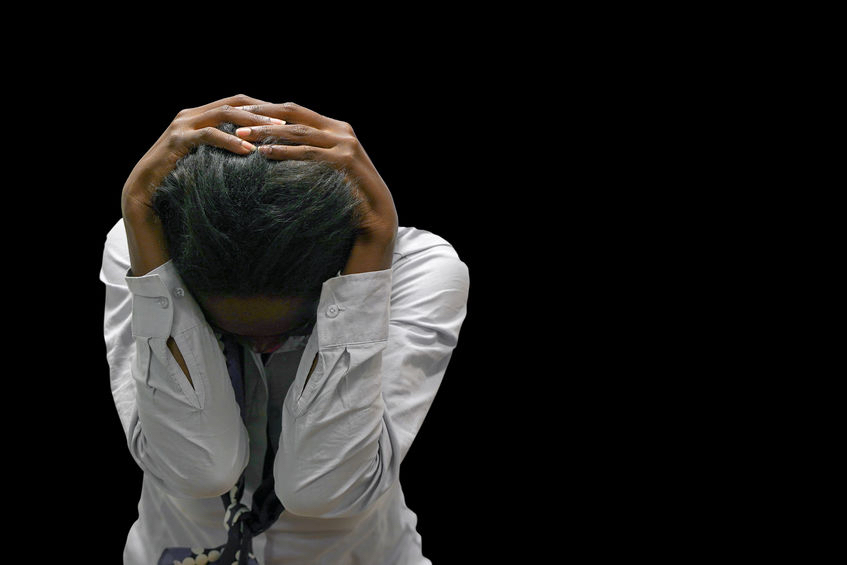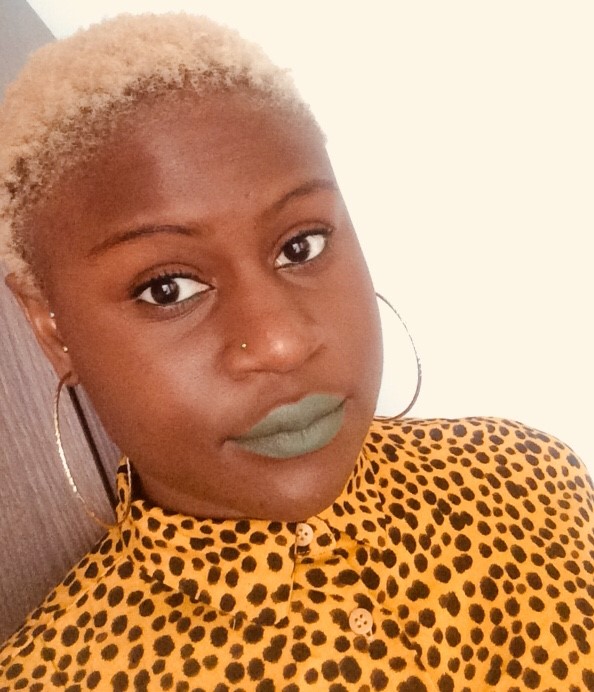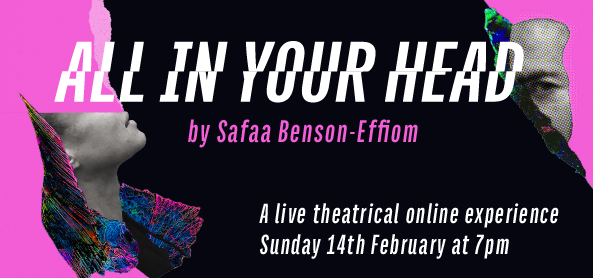All In Your Head is a one-woman play based on real accounts of women who’ve experienced domestic violence and coercive control that’s livestreaming on 14th February. The play’s scriptwriter, Safaa Benson-Effiom tells us why we all need to take the blinkers off when it comes to domestic violence.

It’s unfortunate that as the pandemic goes on, so does the shadow pandemic too. The statistics of domestic abuse have been shocking throughout the pandemic, with support services receiving a 900% increase in referrals, and reports made to police increasing also. It’s sobering to remember that the statistics represents the real story and experience of somebody who needs help and support.
All In Your Head is a one-woman show that’s been brought together by an incredible group of women determined to shed light on this issue. Developed with Wellbeing Practitioner Lou Platt of I May Destroy You, the play seeks to be educational, offer healing, and answer the always heard “why didn’t they leave?” question in a considerate and thoughtful way.
The play’s scriptwriter, Safaa Benson-Effiom writes an exclusive and powerful narrative on how domestic violence has been normalised in Society, and the importance of spotting the signs and championing the safety of women and children.

I remember watching ‘Twilight’ for the first time and desperately wishing I had what they had. Not the high school experience or vampire drama. I wanted to be loved as deeply and as intensely as Edward loved Bella. To be considered someone’s “personal brand of heroin”; their single-minded focus that borders on obsession. As an impressionable teen, theirs seemed like a love to aspire to.
Years later I realised that Edward Cullen possesses all of the marks of an abuser.
He gaslights Bella, insisting that an event she witnessed did not happen. He blows hot and cold – acting disgusted by her very existence one moment, then super friendly the next. He stalks her – saying it’s for her own ‘protection’ – and shows up uninvited to watch her sleep at night. His love for her was such that it did not leave space for family or friends or anything else…but him.
“Whether we realise it or not, pop culture profoundly affects our attitudes and expectations when it comes to love and relationships”
‘Twilight’ is not alone in idealising such behaviours – these narratives are pervasive and insidiously common.
Whether we realise it or not, pop culture profoundly affects our attitudes and expectations when it comes to love and relationships. We look to films, TV shows, music, novels, poetry and social media. We see what we like and what we want, then seek them out for ourselves. This is fine for a Randall looking for their Beth or a Jake looking for their Amy. But what about a Carrie that stumbles across their Mr. Big? Or a Harley Quinn that crashes into their Joker…?
These narratives – targeted almost exclusively at women – warp our societal expectations, romanticising the most twisted dynamics and questionable behaviours. With so many red flags masquerading as romantic ideals, it is not surprising that it often takes time for people to realise that what they are experiencing is in fact abuse.
‘All In Your Head’ is a one-woman show exploring coercive control and domestic violence. We have drawn from pre-existing narratives around gender roles as well as verbatim accounts collected from survivor support groups to create a live-streamed theatrical experience on an issue which has particular pertinence at this time.

Domestic abuse has surged during the pandemic. Government statistics reveal that domestic abuse-related offences recorded by the police in June 2020 were up more than 10% from the year before. Lockdowns and the increased need to stay home have driven these figures up, with perpetrators using the pandemic as a coercive tool.
Society does not treat all victims of domestic abuse the same, with Black women experiencing higher rates of abuse. Founded by Ngozi Fulani, Sistah Space is an organisation that provides support and services for Black women who have experienced domestic violence. Black women are less likely to report their abusers, with reasons varying from fearing they won’t be believed, being subjected to racial stereotypes to even worrying that harm will come to their abusers in police custody. Figures have also revealed that Black women are disproportionately over-represented in reports, despite the fact that white women are more likely to report abuse to the police.
Over 90% of all perpetrators of domestic violence are men. As a result of their social conditioning, violent behaviour is often explained away by biology – the implication being that they cannot help but be the way they are. Indeed, the phrase ‘boys will be boys’ is often employed to excuse harmful behaviour, granting them unwarranted lenience and understanding. Note that there is no snappy phrase that lets women off for misbehaving or inflicting their will on the world…
“Society does not treat all victims of domestic abuse the same, with Black women experiencing higher rates of abuse.”
Women are conditioned to be accommodating in all areas. We are taught to adapt and to prioritise the needs and wants of others above our own. With so many violent and abusive behaviours simply dismissed as ‘how men express themselves’, it is easy to understand how women can get trapped in these situations, with no choice but to permanently exist in survival mode. Many of the survivors that we spoke to shared that they were constantly having to adapt their behaviour to avoid setting off their abuser. As one put it: “I couldn’t get away from the monster in the room, so I learnt to keep it tamed”.
It was surprising to realise that so much of what is classed as abusive today was previously considered to be…normal. Until the mid-70s, women could not open bank accounts or get a divorce without evidence of objective failing, leaving them under the complete control of their husbands.
Domestic violence was so commonplace – and in some cultures still is – that police would overlook the beaten wife to shake the husband’s hand, as he apologised for wasting their time. Spousal rape was not criminalised until the 90s. Society has endlessly enabled and encouraged violence against women. These structures combined with the expectations on women to “keep calm and carry on” reinforces the violence and limits their ability to access critical support.
View this post on Instagram
The news that FKA twigs was suing Shia LaBeouf for sexual assault and battery broke halfway through our research and development phase. The exposure of her ex’s sustained abuse drove home a crucial point that I want ‘All In Your Head’ to communicate: that absolutely anyone can be a victim of domestic violence.
In the New York Times article, she mentioned that: “The whole time I was with him, I could have bought myself a business-flight plane ticket back to my four-story townhouse in Hackney, in London…He brought me so low, below myself, that the idea of leaving him and having to work myself back up just seemed impossible….” Even with her wealth and the means available to her, FKA twigs still struggled to leave the abusive situation. This is a striking example of the control that abusers can wield over their victims.
“I want people to check in with each other: with their strong friends, their quiet friends, their friends that seem to have it all together.”
In an interview with The Guardian in September 2020, Fulani explained that her clients often feared that they would be ‘failed’ as victims, a sentiment that felt all too familiar. During the gas station incident in which she was violently assaulted in public, FKA Twigs said that no one stepped in to help her. She mentioned trying to tell a colleague but that it was brushed over.
It is my hope that our show empowers people to step in, to help. I want people to check in with each other: with their strong friends, their quiet friends, their friends that seem to have it all together. Because whether it’s our inability to notice when others are struggling, or that we’ve gotten so good at hiding when we’re struggling – it’s imperative that we come together to dismantle the systems which encourage the suffering of others.
All In Your Head’ Performance Details
Following the performance there will be a panel discussion with survivors and sector voices, to make sure the audience continues to think about the crucial message.
- Performance Date: Sunday, 14 February 2021
- Performance Time: 7PM
- Location: Online
- Tickets, starting from £0: Buy here
- Instagram: @AllInYourHeadDear
This article was written by Safaa Benson-Effiom. Follow her on Twitter: @chauchoc












